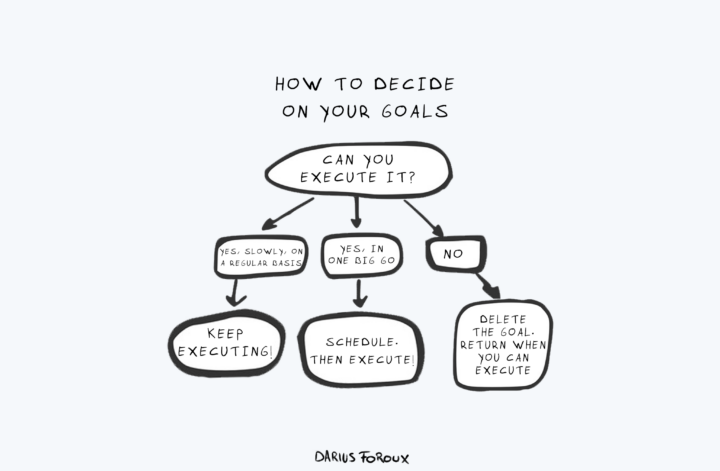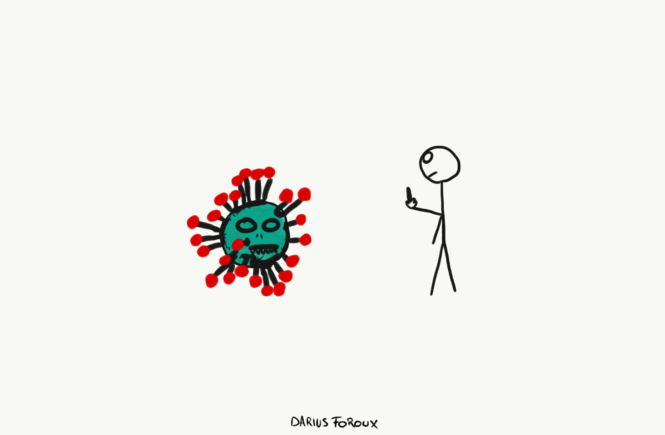Even machines break down. So it’s not surprising that the human mind needs to rest. Now and then, you need to reboot your brain.
One of my friends used to work in customer support at an internet company. He told me that 90% of the customers who called about a problem had the same solution.
“Did you try rebooting your router?”
That simple trick did it. It’s the same for almost every device.
- iPhone stuck? Just turn it off and on.
- The computer won’t react? Restart it.
That got me thinking: Isn’t that also true for our brain?
In daily life, we often run into situations when our brain breaks down (figuratively speaking).
- You’re trying to focus on a task, but your mind keeps wandering.
- You’re feeling overwhelmed with all the information coming at you.
- You’re stuck in a negative thought loop and can’t seem to break free.
- You’re physically tired, but your brain won’t let you sleep.
We’ve all experienced these situations. And just like with our electronic devices, sometimes, we need to reboot our brains.
So, how do we do that? Here are some actionable tips:
1. Get rid of your overwhelming goals
This will give you instant relief.
What’s a big goal that you really want to achieve badly? Something big.
Let me give you an example. For the past few months, I’ve been trying to buy a new house. I really want to move. But the problem is that the market is terrible right now because there’s not a lot of supply, and prices are high.
At some point last month, my brain just froze up. I was stuck. What to do? Pay top dollar for a house? Settle for something I don’t really want? And then I also have to deal with my regular responsibilities and work.
So I said, “Screw the house.” I deleted the goal from my brain and I instantly felt better. It doesn’t mean I no longer want to buy a house. I’m simply no longer pressuring myself. I’ll just focus on enjoying my work and life at the moment.
2. Stop multitasking
Our brains are not designed to handle multiple tasks simultaneously. They perform best when focused on one task at a time. Multitasking often leads to mistakes, stress, and decreased productivity. Instead, try to single-task. Dedicate specific time blocks for each task and stick to them. This will not only improve your efficiency but also reduce mental fatigue.
As the lawyer and writer Susan Cain said:
“What looks like multitasking is really switching back and forth between multiple tasks, which reduces productivity and increases mistakes by up to 50 percent.”
3. Take a few days off or work less
If you can’t take days off work, try to leave early. The point is that we all have responsibilities and we can’t just walk away.
But we also need to nurture our brains so we don’t get overworked. So it’s good to sometimes work a bit less. And then just do nothing.
I apply this strategy with my work, but also with my writing assistant, John. After a very busy period, usually after a course launch or when we finish a book, we both take it easy.
We work fewer hours but don’t stop working completely. We want to keep up the momentum whilst also giving our brains some rest.
4. Limit negative inputs
When your brain breaks down, you must be relentless about not letting negativity in your life. That means:
- No social media: Whether you like it or not, social media makes you jealous, angry, or restless. Just get away from it to protect your mind.
- No negative friends: We all know people who complain all the time. Avoid them.
- Good times with your inner circle: Make an effort to do something nice with your partner, siblings, children, or parents. The people who are closest to you.
If your inner circle is causing you stress, talk about it. Bring your issues and mental health in the open. If the people in your life don’t know what you’re going through they can’t help.
The point is to remove negative energy and boost positive energy. Not forever because that’s unrealistic. But take a few days or a week to recharge.
5. Take a long walk
Go out for a few hours. Maybe with someone you love. Or when you go alone, listen to a fascinating biography. That way you feel like you’re spending time with someone else.
Research shows that walking frequently, doing 10,000 steps a day, and keeping a brisk pace can all help lower your risk of cancer, dementia, cardiovascular disease, and even premature death.1Source: CNBC
Taking long walks is good for your overall health. I love it.
6. Sleep early
Go to bed early tonight. Skip the usual evening TV time and go to bed early. Simply read a book or journal in bed.
You want some light brain activity so you don’t end up overthinking in bed. That’s the last thing you want.
Find a nice book you’re excited about. Then get into bed and start reading! Spending an hour or more reading is a rarity in this world.
This year, I noticed that I stopped reading for longer periods. I would read for 10 minutes in the morning and 10 minutes in bed. As a result, I read less. But in the last several weeks, I’ve been reading more. And especially when you spend an hour reading, you feel much calmer.
It’s like running. When you’re on a longer run, you start feeling great and focused.
Same with reading. I call it reader’s high. Try it out.
Regular reboots are the key
Remember, just as you wouldn’t keep your computer running without ever restarting it, you shouldn’t push your brain to its limits without giving it a chance to rest and rejuvenate.
So next time you feel like your brain is ‘breaking down’ try these tips to give it a reboot.




